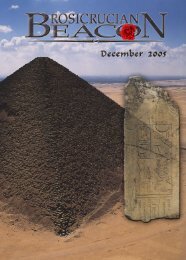Part 2 - AMORC
Part 2 - AMORC
Part 2 - AMORC
You also want an ePaper? Increase the reach of your titles
YUMPU automatically turns print PDFs into web optimized ePapers that Google loves.
EINSTEIN: Is it not polyphonic?TAGORE: Instruments are used, not for harmony,but for keeping time and adding to the volumeand depth. Has melody suffered in your music bythe imposition of harmony?EINSTEIN: Sometimes it does suffer very much.Sometimes the harmony swallows up the melodyaltogether.TAGORE: Melody and harmony are like linesand colours in pictures. A simple linear picturemay be completely beautiful; the introductionof colour may make it vague and insignificant.Yet colour may, by combination with lines, creategreat pictures, so long as it does not smother anddestroy their value.EINSTEIN: It is a beautiful comparison; line isalso much older than colour. It seems that yourmelody is much richer in structure than ours.Japanese music also seems to be so.TAGORE: It is difficult to analyse the effect ofeastern and western music on our minds. I amdeeply moved by the western music; I feel that itis great, that it is vast in its structure and grand inits composition. But our own music touches memore deeply by its fundamental lyrical appeal.European music is epic in character; it has a broadbackground and is Gothic in its structure.EINSTEIN: This is a question we Europeanscannot properly answer; we are so used to our ownmusic. We want to know whether our own musicis a conventional or a fundamental human feeling,whether to feel consonance and dissonance isnatural, or a convention which we accept.TAGORE: Somehow the piano confounds me. Theviolin pleases me much more.EINSTEIN: It would be interesting to study theeffects of European music on an Indian who hadnever heard it when he was young.TAGORE: Once I asked an English musician toanalyse for me some classical music, and explainto me what elements make for the beauty of thepiece.EINSTEIN: The difficulty is that the really goodmusic, whether of the East or of the West, cannotbe analysed.TAGORE: Yes and what deeply affects the heareris beyond himself.EINSTEIN: The same uncertainty will alwaysbe there about everything fundamental in ourexperience, in our reaction to art, whether inEurope or in Asia. Even the red flower I see beforeme on your table may not be the same to you andme.TAGORE: And yet there is always going onthe process of reconciliation between them, theindividual taste conforming to the universalstandard.We are immortal in essence…our goal is to become aware of thisand to act accordingly.To do so we have no other choicethan to go deep withinour innermost self,within our Inner Temple;to contemplate Beautyand to receive eternal Knowledge.44The Rosicrucian Beacon -- June 2008











